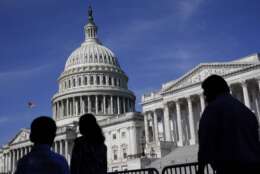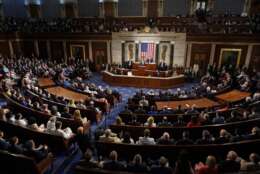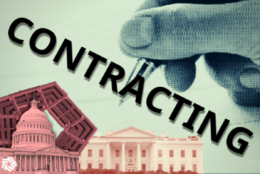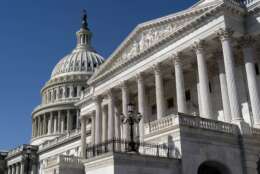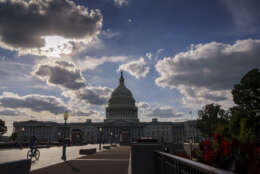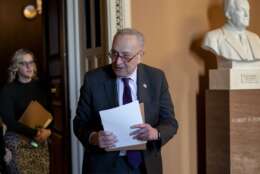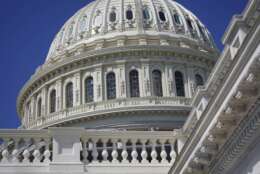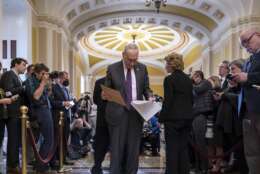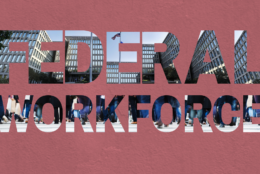Government Shutdown
-
The House and Senate appropriations packages are far from the only priority for Congress this fall — and many of the other to-do items have direct impacts for federal employees.
September 07, 2023 -
In today's Federal Newscast: A senator and congressman are moving to end government shutdowns once and for all. The Office of the National Cyber Director is developing a new cyber-posture report to help evaluate the current state of American cybersecurity. And victims exposed to Camp Lejeune's contaminated water have a new way to resolve their claims.
September 07, 2023 -
The Senate has returned to Washington. The House remains on recess for another week. Either way, Congress faces a haystack of work, and precious little time in the fiscal year to do it. For an update, Federal Drive Host Tom Temin spoke with Bloomberg Government congressional reporter, Zach Cohen.
September 05, 2023 -
The White House says Congress should pass a short-term funding measure to ensure the government keeps operating after the current budget year ends Sept. 30. An official with the Office of Management and Budget says lawmakers would very likely need to pass a temporary spending measure in September to prevent a potential partial shutdown. The official wasn't authorized to discuss the administration’s plans and spoke to The Associated Press on condition of anonymity. Without such congressional approval, parts of the federal government could shut down when the new budget year begins Oct. 1. That would jeopardize federal programs on which millions of U.S. households rely.
August 31, 2023 -
The main question now is whether Congress will enact a continuing resolution come October 1, or whether we'll have a government shutdown. Either way, things will get messy come September 30. Joining the Federal Drive with some shutdown preparation tips for contractors, federal sales and marketing consultant Larry Allen.
August 29, 2023 -
A federal judge in Massachusetts will hear oral arguments next Wednesday in a lawsuit that argues both that federal employees must be paid even if Congress doesn’t increase the debt ceiling, and that the ceiling itself is unconstitutional.
May 26, 2023 -
More questions than answers surround the possibility of a government debt default. But it wouldn't be good for federal employees or retirees.
May 18, 2023 -
If you see a robed figure on the corner with a sign reading, "The End is Near," take note. He could be talking to federal contractors. The longer the debt limit debate in Congress drags on, the more likely it will interrupt federal buying.
April 11, 2023 -
A host of bills lawmakers reintroduced this week would impact retirement savings for federal fighters and federal law enforcement officers, as well as offer feds a grace period for payment obligations during a government shutdown or debt default.
March 03, 2023 -
In today's Federal Newscast: The court fight continues over government shutdown double back pay. A New York congressman is urging CISA to examine air traffic control vulnerabilities. And the State Department will pay $37 million in a class-action lawsuit involving some 230 disability discrimination cases.
January 18, 2023 -
With Republicans in charge of the house and Democrats the Senate, you can bet on sharp disagreements over the budget. In fact, it's not too early to worry about an impasse leading to a government shutdown.
January 17, 2023 -
President Joe Biden has signed legislation to fund the government for an additional week as lawmakers race to finish work on a full-year spending package before they head home for the holidays and a new Congress is sworn in. Congress in September passed a bill to keep the government running through midnight Friday. The latest extension funds federal agencies through Dec. 23. That will give lawmakers more time to fashion a roughly $1.7 trillion package currently being negotiated that would finance the day-to-day operations of government agencies for the full fiscal year.
December 16, 2022 -
In today's Federal Newscast: The chances that Congress will shut down the government look slim ... maybe. Space Force guardians sharpened their skills tracking Artemis between the Earth and the moon. And the State Department is planning to create a new bureau to address future infectious disease outbreaks and pandemics.
December 14, 2022 -
Lawmakers leading the negotiations on a bill to fund the federal government for the current fiscal year say they’ve reached agreement on a “framework” that should allow them to complete work on the bill over the next week and avoid a government shutdown.
December 14, 2022 -
The Court of Appeals for the Federal Circuit found the government isn't liable for damages when it fails to pay employees on time during government shutdowns.
November 30, 2022

